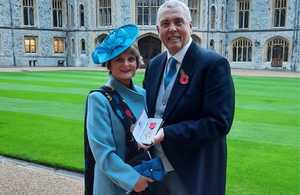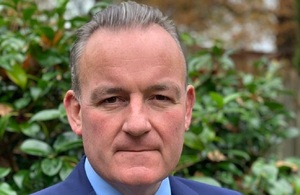Largest ever increase in funding for drug treatment
- Record £780 million to rebuild drug treatment system
- Investment underpins new ten-year strategy published today to tackle scourge of drugs and prevent crime
- Every local authority in England to receive extra funding to combat drug and alcohol misuse over next three years, with areas in greatest need receiving extra funding first
Communities all across England will receive the largest ever funding boost for drug treatment services to help people and reduce crime on our streets, under a new strategy published today.
The money will go towards improving access to treatment and increasing the capacity of services, helping to reverse the upward trend in drug use and level up by tackling this major driver of crime, which we know disproportionately impacts the most vulnerable and poorest communities.
The government’s new strategy to tackle drugs, sets out a bold, long-term vision for the next decade. It is designed to cut crime and reduce both the supply and demand for drugs by getting more people into treatment, breaking the cycle of crime driven by addiction and keeping drug-related violence out of neighbourhoods across the country.
The strategy is backed by a new investment of almost £780 million for treatment – the largest ever increase – bringing total spending on drug enforcement and treatment to more than £3 billion over the next three years.
A world-leading treatment system will be developed for those dependent on drugs and support them to kick their addictions, prioritising areas with the greatest need.
Over the next three years, all local authorities will receive new money for treatment and recovery with the 50 local authorities in greatest need receiving this first to ensure that better access to treatment is fast tracked for the poorest and most vulnerable.
Illegal drugs carry a cost to the taxpayer of nearly £20 billion every year and almost half of all burglaries and robberies are committed by the 300,000 heroin and cocaine addicts in England with whole communities forced to endure the misery these cause.
Health and Social Care Secretary, Sajid Javid, said:
This is a huge moment which will not only save lives but help level up the country.
We’re investing a record amount into treatment services with money to break the cycle of drug use and to support communities by cutting the drug use which drives crime.
Treatment services are just one part of the comprehensive strategy which includes helping people back to work, into permanent housing, and cracking down on supply.
To cut crime and reduce drug related deaths and harms over the next three years, the government will:
- Increase and improve treatment services to reduce harm and improve recovery rates significantly. This will mean more people receiving better quality treatment, including developing and expanding the treatment workforce, helping to prevent crime.
- Improve offender drug treatment across the Prisons and Probation Service in England and Wales to get more offenders engaged in treatment, including mandatory and voluntary testing regimes in prison, support for prisoners to engage with community treatment ahead of their release and increasing the use of intensive Drug Rehabilitation Requirements for those on community sentences. This will help cut crime as those receiving treatment for their addiction are known to be half as likely to reoffend.
- Increased housing support and access to treatment for those at risk of sleeping rough.
- Roll out individual employment support across all Local Authorities in England by 2025 based on effective existing models to help people in recovery to get a job by supporting them to be ready for work and helping them to find a job that is right for them.
- Investment to implement employment support including a peer mentoring programme for those with a drug or alcohol addiction.
Dame Carol Black, whose independent review into the issue of drugs helped shape the strategy, will monitor and advise on the progress of the strategy with the government producing an annual update.
Professor Dame Carol Black said:
Enormous human tragedy surrounds the lives of people dependent on drugs. This investment will transform substance misuse services, providing people with high quality treatment and support for recovery.
Therefore, I am delighted that the government is making this very significant investment in drug treatment and recovery services, alongside the funding allocated to tackle drug supply. The investment to improve housing support and employment opportunities is just as critical because people need hope, purpose and practical steps to help them achieve a better future.
This strategy comes with high expectations and I look forward to advising the central unit and relevant government departments to ensure there is a step change in treatment, recovery and prevention.
The role of dedicated Health and Justice Partnership Co-ordinators, who liaise between prisons, probation and treatment providers, will be expanded to cover every region in England and Wales. This will mean services in prison and the community are better joined up and offenders’ treatment plans remain consistent, helping them to stay on track and break the cycle of reoffending once and for all.
A pilot will trial a new approach to how the courts deal with offenders with a history of drug abuse, where they will be seen regularly by the same judge, who has the power to order a number of sanctions and incentives, such as mandatory drug testing. Currently only offenders who agree to undergo treatment programmes can be subjected to regular testing. It is hoped this new approach will increase compliance with treatment and deter offenders from returning to drugs as, should they test positive, they may be in breach of their order and could face prison time.
The strategy also sets out a £300 million investment to crack down on supply chains and criminal gangs profiting from the trade in illegal drugs. This will go towards action to:
- Dismantle over 2,000 county lines – which are used to supply drugs and often involve recruiting children – and making thousands more arrests.
- Carry out 6,400 disruptions against the activities of organised criminals to reduce illegal drug trafficking.
- Invest up to £145 million in the County Lines Programme, continuing to bring line holders to justice, targeting the road and rail networks and protecting those exploited and supporting them to rebuild their lives.
Combating Drugs Minister, Kit Malthouse, said:
Drugs degrade society – they drive crime, destroy families, and illegal drugs use claims more lives each year than all stabbings and road traffic accidents combined.
That is why, today, we are setting out our a 10-year plan to help drive drugs out of our cities, towns and villages and make sure those ensnared in the grip of addiction get the help they so badly need.
This is a record level of investment and will bring our total spending on drug enforcement, treatment and recovery to more than £3 billion over the next three years – but more importantly, it will change the lives of millions of people affected by this poison.
To achieve a generational shift in demand for illegal drugs, further action will be taken to:
- Invest £15 million over 3 years in rolling out drug testing on arrest through police forces across England and Wales.
- Invest £5 million in an innovation fund to develop a world-leading evidence base to better understand what works in driving changes in attitudes towards drug use.
- Invest £9 million on the Tough Consequences out of court disposals scheme which will make sure more people using illegal drugs receive a relevant and proportionate consequence. This will deter people from drug use through a range of potential civil penalties which could include fines, curfews, or in the most exceptional cases, the temporary removal of driving licences or passports.


